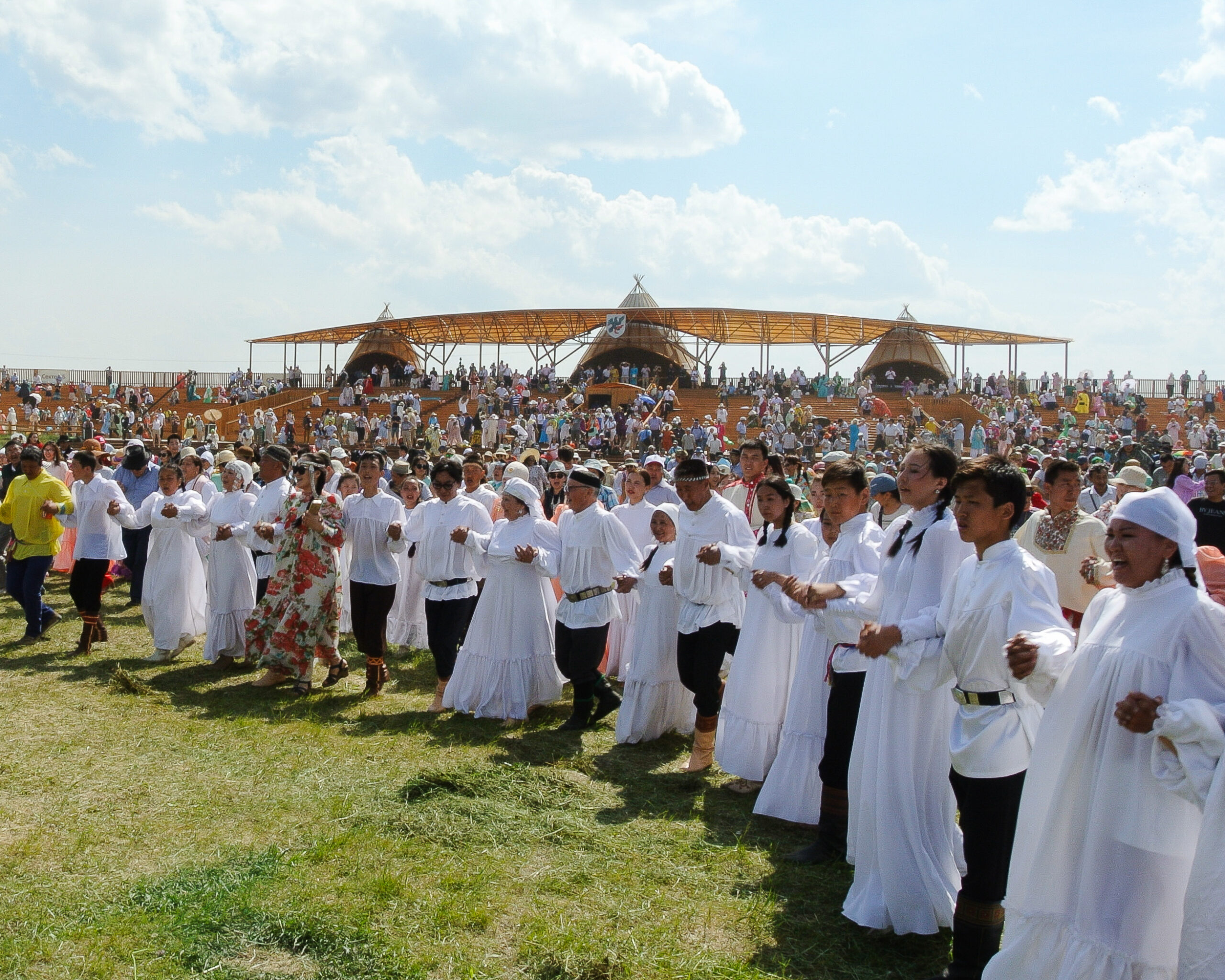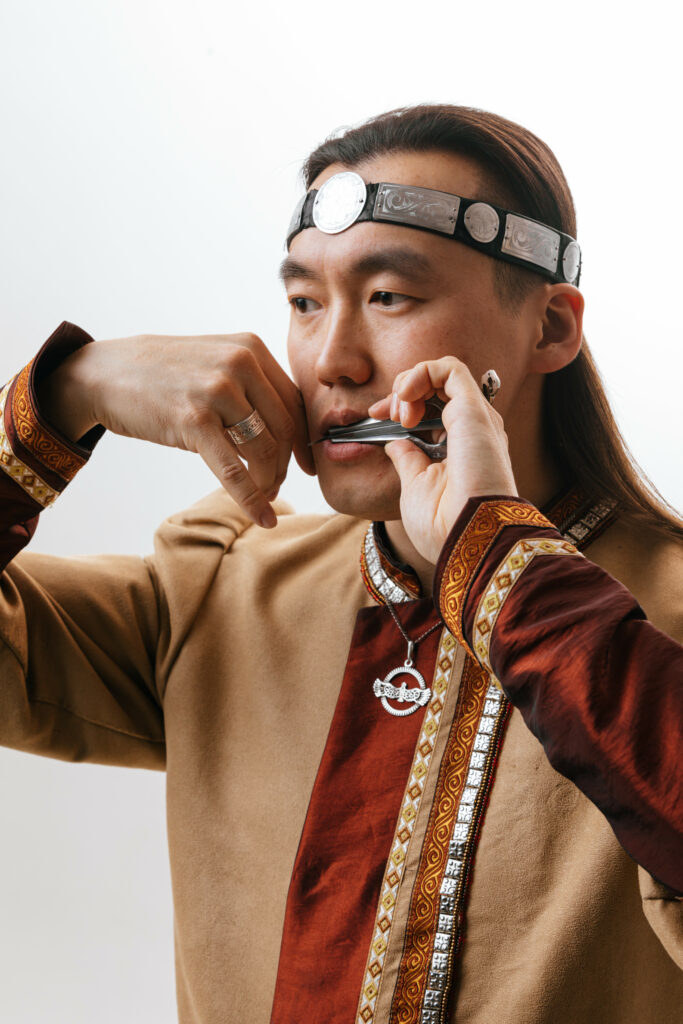“We are not above the nature” – In the Republic of Sakha, the traditional “Ayii Itegele” faith still lives on

People dance traditional round dance “osuokhai” during the celebration of Ysiakh. PHOTO: ERKIN QUOMUSSOUL.
Tuiaara Linnala
Published 22.04.2024 at 1:38
I vividly recall my grandmother’s words, as she took me to the forest as a child. “Do not shout, you disturb the spirits. This is not your home.” Or “don’t dig the ground for no reason. How would you feel if someone started cutting you?”
Her reasoning sprang from Aiyy Itegele, the traditional faith of the Yakutian people. It would be easy to dismiss this kind of talk as a silly story by a grandmother, but in the Republic of Sakha, in Far East of Russia, where my family comes from, the Aiyy Itegele is more than that. It’s a living part of the culture.
That became clear when I was kayaking at the Buotama river in summer 2020. During a stop on the riverbank, I had a conversation with a local villager. I told him that the river was shallow, and I could walk from one bank to another.
To my surprise, the person didn’t find it funny. “Don’t say it out loud”, he said. “The river might hear you tone and show you that you are the weaker one. You should apologize.”
Everything has its own spirit
The Yakutian or Sakha people believe that humans are not above the nature, but only a small part of it. Therefore, the nature should be respected and even feared. That’s why also my grandmother would get angry if she saw someone disrespecting the nature.

According to Aiyy Itegele, the universe consists of three worlds, the upper, the middle and the lower world. The upper world is where the creator and the other deities live, and the lower world is the home of the dark forces. We humans were originally from the upper world, but now we inhabit the middle world. And we are not alone.
Everything in the middle world has a spirit, Icchi. Rivers, lakes, stones, forests, houses, flowers, the ground – it all has an Icchi.
These spirits are neither bad nor good but neutral. They, however, require respect. So, when interacting with the rest of the nature, humans are expected to clearly state their intention, pay respect, and ask the spirits to be on their side.
This is done by feeding the spirits. For instance, when a hunter leaves for hunt, they leave small amount of food under a tree and ask Baianai, the Icchi of the forest to protect them and give them prey. All the animals in the forest belong to the Baianai, so the hunter needs to promise that they only take what they need and don’t kill extra out of greed.
If the spirits are not fed and respected, it can lead to a punishment.
If something bad happens to a person, here in the West it would probably be called an accident. But we Yakutians would see it as a punishment of the Icchi.
Only a shaman can interact with the evil spirits
This only applies to the neutral spirits inhabiting the middle world. According to Aiyy Itegele, the dark spirits of the lower world are evil.
“They see us as flesh and meat that they want to eat. They feel our fear; they hunt for us”, says Erkin Qomussoul. He is a Yakutian ethnomusician, who uses Aiyy Itegele rituals and traditional Yakutian mouth harp khomus in his art.

If a person would get deadly sick, Yakutian people’s interpretation would be that a demon is eating them from the inside, taking their life energy. The only person who could help, would be a shaman.
“The shaman would find the demon and either fight it or negotiate with it”, Erkin explains. “In negotiations, he would ask the evil, what they would want instead of this human’s life. Usually, they agreed that relatives pay by giving the demon a few cows’ heads”.
To become a shaman, a person with “open soul for extraordinary energies” is needed. This means a someone, who can see or hear things that an average person does not.
Often the potential shaman also suffers from uncontrolled seizures, hysteria, or epilepsy.
“The person would get so sick that no one could help him. The only way is another shaman to teach them”, Erkin says. “The person would then go through rebirth, where dark forces would take and eat their soul. Then the person becomes a shaman.”
From secret celebrations to the biggest holiday of the people
Aiyy Itegele is not tied to any official religion; rather it is a spiritual belief. For generations, the information about the faith was spread orally. Special persons went from home to home and sang the Olonkho, the myth of world’s creation.
The Olonkho was written into a book in the 20th century, but still the oral tradition of passing along the faith is strong. One of the persons sharing the knowledge is called Uyskhaana Lukina.
She is a retired TV host on NVK Sakha media, where she used to host a TV and radio program called Ayii Ogoto for kids about Yakutian culture and traditions. Uyskhaana calls spreading the information about the Yakutian faith her life mission.
During the Soviet times, most religions were prohibited. This applied to Yakutia as well.
For example the shamans were persecuted. Their role was highly respected in Yakutian culture, but the Soviet government targeted the shamans publicly and forced them to abandon their practices.
Many traditional holidays that had their origins in faith were also banned. The best example is Ysiakh, the biggest traditional celebration of the Yakutian people.
Ysiakh has been celebrated from approximately the 12th century. The tradition is said to have been started by Ellei Bootur, historical founder of the Yakutian people. It is celebrated on the summer solstice, June 21. It is a spring-summer holiday in honor of the deities of Aiyy, the revival of nature, and the beginning of a new life cycle.
Despite all of this, the Aiyy Itegele faith survived the Soviet times. Uyskhaana remembers, how the traditon lived on under the surface.
“Even though Ysiakh was banned, people still gathered secretly in small villages, where they could worship the creator and nature.”

After the collapse of the Soviet Union, the rebirth of the traditions began. Year after year, celebration of Ysiakh got bigger and more widespread.
First it looked more of a picnic with some traditional elements, but each year the Yakutian traditions and the faith got bigger role. It seemed like people were waking up after a long sleep.
Nowadays, the Ysiakh is the biggest celebration for Yakutian people; it is the time to wear traditional clothes and worship the sun that gives life. Uyskhaana is confident that Aiyy Itegele will live on to the future generations.
“I am not scared anymore that our traditions, culture, or language will disappear. We have a strong connection with nature and our ancestors’ spiritual knowledge.”
A living faith
For me personally, Aiyy Itegele has been something that has followed me from the childhood. I grew up witnessing a pagan lifestyle and took it with me even when I moved to live in a totally different part of the world.
Yakutian faith is not based on fear or prohibitions; it gives freedom. Certainly, it has a concept of what is good and what is bad, but a person has the freedom to choose.
And when a person dies, there’s no heaven or hell waiting. Their soul just returns to their ancestors.
We don’t need a church or any special place to pray. The forest is enough.
I believe that I need to be grateful, respectful, and ask for the protection of the land that is hosting me currently, and I can always feed spirits to pay my venerations.